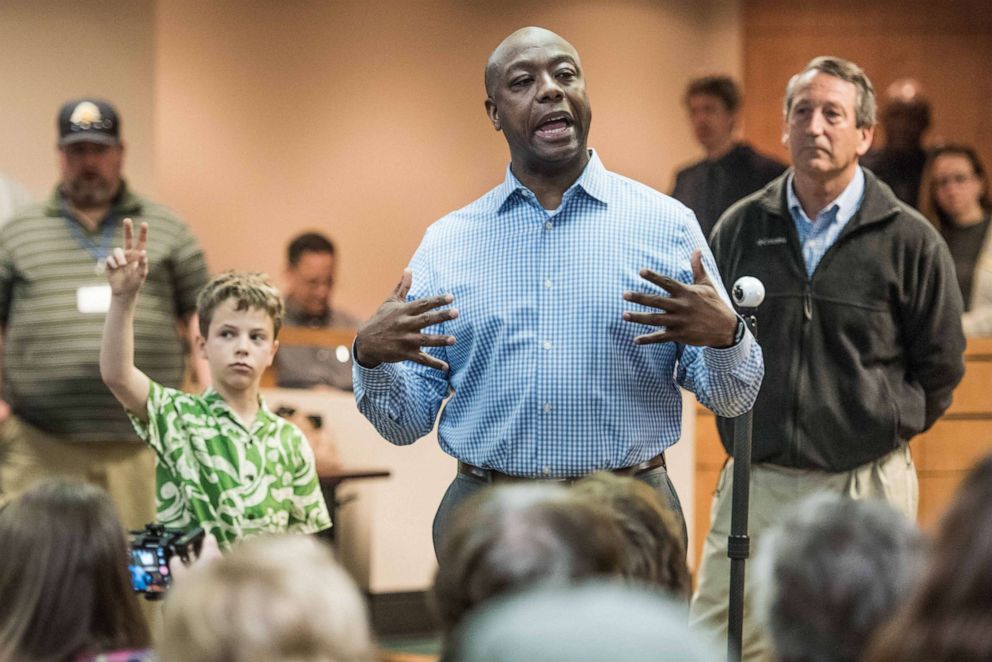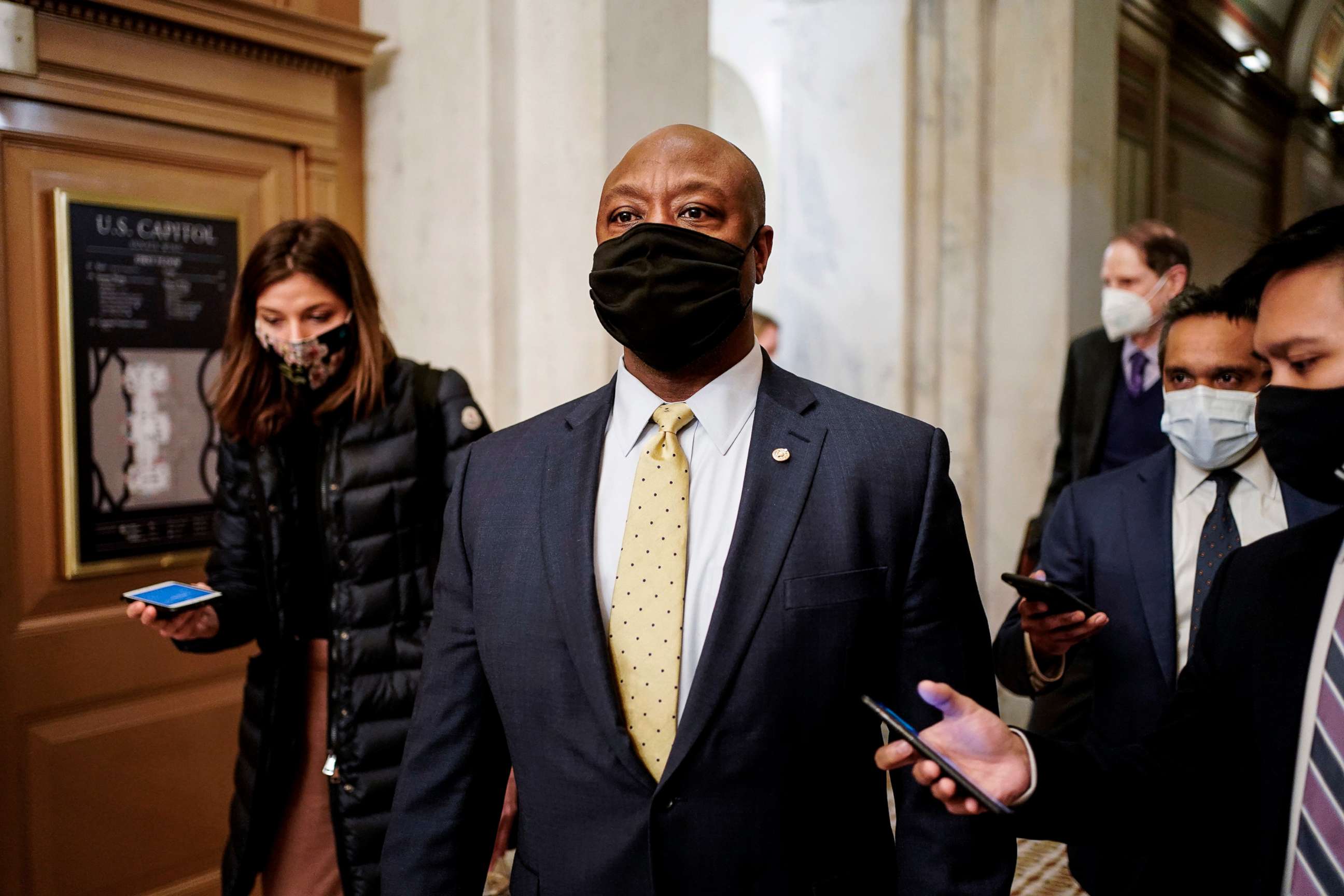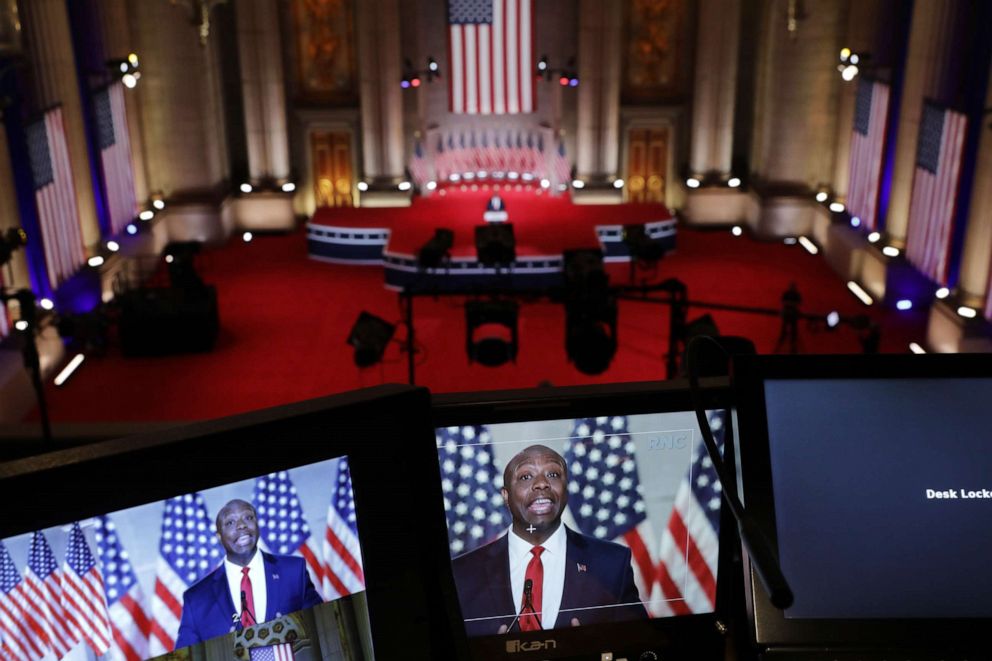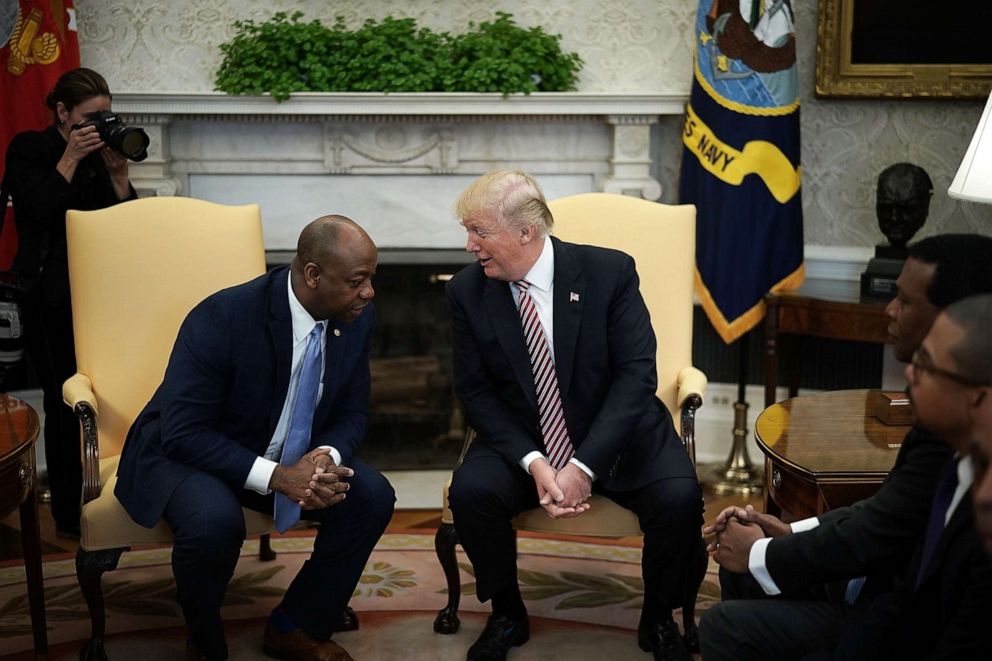Sen. Tim Scott is expected to deliver a hopeful speech on GOP values
He's approaching his moment in the national spotlight with humor, new socks.
South Carolina Sen. Tim Scott is approaching his moment in the national spotlight Wednesday night -- when he will deliver the Republican response to President Joe Biden's first address to a joint session of Congress -- with a bit of mystery, humor, a pair of new socks and some relaxation time with his mother.
"Chilling. Normal things. Lots of ice cream and cookies and sitting on the couch, hanging out a little bit," Scott said of his preparations on Tuesday. "From my perspective, you figure out who your audience is, you figure out what you want to say, you try to find a way to say it well, and you lean into who you are."
An aide added that the senator spent some quality time with his mother over the weekend, and before the speech, he would -- as he often does -- pray.
Asked what issues he would address, the senator teased, "I think it should be a surprise to everybody, and sometimes it will be a surprise to me, too," adding that he has done "a bunch" of practicing.

"I bought a new pair of socks for tomorrow," said Scott, ever the connoisseur of fancy foot accessories, who is often in competition with the now-famous Capitol Police Officer Eugene Goodman.
Scott promised to reveal a picture of his new purchase before Wednesday night.
"You do what you're supposed to do. You do your homework and you do your best to understand and appreciate the issues as they are -- and anticipate what (Biden) is going to say and be in a position to share with the nation a different way, at least, I think is a better way," Scott told ABC News in a brief interview. "I try to keep it simple."
Being chosen to deliver the Republican response to a president's State of the Union address -- or "joint address," as it's called in the first term -- can be a feather in an ambitious politician's cap, but at times, the stress of the moment can practically be his or her undoing, as was the case with then-Gov. Bobby Jindal. In 2009, the Louisiana Republican -- a rising star in the party -- nervously stared at the camera, awkwardly wished viewers a "Happy Mardi Gras," and gave what one Fox News host described as "an amateurish, sing-songy" speech that was also panned by comedian Jon Stewart as "Mr. Rogers-esque."
Sen. Marco Rubio, R-Fla., had his own stumbling moment which he has since laughed off. Responding to President Barack Obama's address, a nervous Rubio, visibly sweating, paused mid-speech to guzzle water from a tiny bottle. Twitter was relentless.
Offering advice to his friend and colleague on Tuesday, Rubio advised Scott, "Drink lots of water beforehand."
It's a potential problem that Scott's own staff has already prepared for.
"Water glass, not water bottle," a Scott spokeswoman laughingly told ABC News.

It can be a somewhat thankless task given the stark differences in speeches for the big night, with a president inside a packed chamber -- his allies roaring with applause throughout the speech. But the politician who must deliver the response -- by tradition, five minutes after the president wraps his speech -- must do so typically to an empty room with precious few of the trappings of a presidential address. This year's scaled-down affair at the Capitol, due to the coronavirus pandemic, could somewhat level the playing field for Scott.
GOP leaders bestowed Scott -- the chamber's lone Black Republican -- with the honor as the country continues to grapple with racial justice issues in the wake of the guilty verdict of police officer Derek Chauvin for the murder of George Floyd and he represents the GOP in negotiations over policing reform. But the speech will not focus entirely on policing reform.
"I think it will be an excellent outline of what our party believes ought to be the direction of the country," Senate Republican Leader Mitch McConnell said Tuesday.
Another moment in the spotlight
A Scott spokeswoman told ABC News that the speech, which is expected to run about 10 minutes, would be similar in tone with his 2020 address to his Republican National Convention address where the senator gave one of the few hopeful and more upbeat messages in an evening full of dark warnings if Democrats were to take control of Washington.
In echoes of past speeches, Scott, 55, spoke about how "a poor Black kid from a single-parent household" could go "from cotton to Congress in one lifetime."
"The truth is, our nation's arc always bends back towards fairness. We are not fully where we want to be ... but thank God we are not where we used to be," Scott said.
The senator connected to the average American, telling the story of his parents divorcing when he was just 7 years old, his mother working 16 hours a day to provide for her children, and he, his mom and brother "sharing a room and a bed."
He recounted failing ninth grade but said his mother never stopped believing in him.
"My mother always said, 'When you shoot for the moon, even if you miss, you will be among the stars.' She never lost faith in me, even when I lost faith in myself," said Scott.
As a one-time small businessman with a successful Allstate insurance practice, he hit on the benefits of tax cuts and touted President Donald Trump's fixes for the pandemic just starting to hit the American economy.
But it is policing reform that has catapulted Scott to national prominence and it is that focus that will be front and center Wednesday night.
Negotiating police reform
Scott is currently deep in bipartisan negotiations, sanctioned by leadership, with the very Democrats who were instrumental in sinking his 2020 reform effort -- at the time calling it "shameful" and merely a political exercise. Scott, Sen. Cory Booker, D-N.J., and Rep. Karen Bass, D-Calif., are trying to find a compromise to reform law enforcement practices, as the nation grapples with the explosive issue in the face of high-profile encounters between Black men and police.
Democrats blocked Scott's attempt last year to pass his Justice Act that focused on using federal dollars to incentivize police departments to drop controversial practices, like the carotid chokehold that was used on Floyd, employing more body cameras, making lynching a federal hate crime, increasing training -- particularly in descalation tactics -- and establishing a commission to study the use of "no-knock" warrants in drug cases -- a move that could, Scott said at the time, eventually lead to an outright ban.

Senate Majority Leader Chuck Schumer, D-N.Y., sat down with Booker and Sen. Dick Durbin, the chamber's number two Democrat and chairman of the Judiciary Committee, and said later Monday that the talks were showing "good progress."
Booker has studiously avoided discussing any detail of those negotiations but on Tuesday said, "Tim and I disagree on a whole bunch. Obviously he's a Republican. I'm a Democrat, but he's a friend. ... He's a good faith actor, and he's also a Black man in America and knows a lot of these issues, personally. So, if anybody can get it done on his side, he's the right person to be negotiating."
Indeed, Scott has recounted multiple instances in which he felt he had been unfairly targeted by police because of the color of his skin.
In a 2020 opinion piece in USA Today, Scott wrote, "At the age of 21, I was pulled over for simply having an improper headlight, and yet the officer felt the need to place his hand on his weapon and call me 'boy.' Even today, while I have the privilege of serving as a United States senator, I am not immune to being stopped while driving at home in South Carolina or even while walking onto the grounds of the Capitol. Each time, I hold my breath and each time, I have been able to exhale and go about my business. Thank God!"
On Tuesday, Booker said of the talks, "My goal is to get something done as quickly as possible. I think the time is now. I think history has its eyes on this moment as we continue to see unarmed African Americans being killed by police. It's just a constant daily reminder almost."
Key sticking points include whether or not police officers should continue to enjoy broad immunity from lawsuits, known as "qualified immunity. Scott has proposed holding the police department of an offending officer accountable, but Democrats have yet to agree to such a pitch. They are also grappling with whether the Pentagon should send surplus military equipment to localities, something many Democrats want stopped.
Still, the group is hopeful.
"I do think we can get this done. We have to," Scott told reporters last week, though the Republican is navigating difficult political terrain where the GOP has tended to stand staunchly behind police officers, spurning last year's House-passed legislation, named for Floyd. It would have banned chokeholds like the carotid hold, no-knock warrants in federal narcotics cases, eliminated qualified immunity, limited military-grade equipment sent to localities, and established a national police misconduct database. Then-Majority Leader Mitch McConnell, R-Ky., shelved the bill and blamed Democrats for rejecting the Scott bill.
While negotiators this time around have drawn few redlines, Scott has one -- telling reporters that lowering the threshold of criminal intent required for convicting a federal law enforcement officer is "off the table."
'A living, breathing unicorn'
Scott has often referred to himself as "a living, breathing unicorn."
When he was first elected to the House in November 2010, he was the first Black person in the GOP since 2003 and was the first Black Republican from the South since 1901. In joining the upper chamber, he was the lone African American senator and is still the only Black Republican there.
In December 2010 he declined to join the Congressional Black Caucus, saying at the time, "The black community, like all communities, will benefit when businesses can use their profits to hire more workers instead of paying higher taxes."
And though he entered Congress on the anti-government tea party wave, Scott never embraced that label. He is a conservative.
Not a politician by training, Scott has become adept over the years in navigating sticky political situations, with most Republicans -- and many Democrats -- holding an extremely high opinion of him.

Even with the mercurial Trump, Scott received nothing but praise. The senator even started off as a Rubio supporter in the 2016 presidential primary, which is something that might normally have made him persona non grata with a president known for holding grudges. To the contrary, Scott often served as a sounding board for Trump on racial issues, even bucking the president when he thought he had stepped out of line.
It is unclear if Scott has designs on higher office. He he told a hometown newspaper that he would run for reelection in 2022, but that run would be his last.
Many GOP strategists think Scott is quietly preparing for a 2024 presidential run. He recently traveled to the politically-critical state of Iowa and revamped his Senate website to include a large American flag in the background.
As he steps to the lectern Wednesday night, under the watchful eye of former Sen. Mike Mansfield -- a Democrat and the chamber's longest serving majority leader who navigated the toughest of political environments as he shepherded landmark civil rights legislation to passage -- Scott's future prospects could receive a substantial boost if he is able to deliver a memorable 10 minutes.




